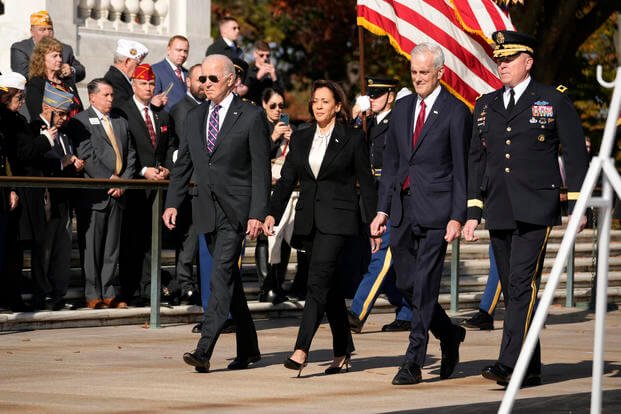
The White House is threatening to veto the annual Department of Veterans Affairs[1] and military construction funding bill over GOP-backed riders that would undo VA policies on LGBTQ+ veterans and abortion.
The bill as written by House Republicans "includes numerous, partisan policy provisions with devastating consequences including harming access to reproductive health care, threatening the health and safety of Lesbian, Gay, Bisexual, Transgender, Queer, and Intersex (LGBTQI+) Americans, endangering marriage equality, hindering critical climate change initiatives, and preventing the administration from promoting diversity, equity and inclusion," the White House budget office said in a statement Monday.
"If the president were presented with H.R. 8580, he would veto it," the statement added, referring to the bill by its number.
Read Next: Navy Shakes Up Commanders' Merit Promotions[2]
The statement signals that efforts to come to an agreement on funding the government in the next fiscal year could be as much of a slog as they were this year, when dispute over funding levels and partisan politics brought the government to the brink of shutting down several times and kept an agreement out of reach for half the fiscal year.
At issue now is the fiscal 2025 VA and military construction appropriations bill that was advanced[3] by the House Appropriations Committee last month and that the full House is scheduled to vote on later this week.
Both chambers of Congress must pass the bill before it would get to the president's desk to veto, and the Democratic-controlled Senate is not likely to accept the controversial riders. But Monday's statement serves as a warning ahead of negotiations that could be particularly difficult this year with election year politics looming large.
The bill would provide the VA with $129 billion in discretionary funding for fiscal 2025, including $113 billion for medical care, which matches the administration's budget request. It would also allocate $18 billion for Pentagon construction projects, including $1.1 billion to design and build new barracks.
The White House is not taking issue with the funding levels, with the statement noting that the administration "appreciates" that the bill would provide the VA with enough funding to "continue supporting key priorities including veterans' health care and critical investments in caregiver support programs, construction of needed facilities, claims processing and national cemeteries."
But on the whole, the White House said it "strongly opposes" the bill because of the partisan policy provisions.
Among the provisions the White House is taking issue with is one that would reverse the VA's policy of providing abortions in cases of rape, incest or where the life or health of the mother is at risk. The bill would instead make the VA follow what's known as the Hyde Amendment, which bars most federal funding from going toward abortion, with limited exceptions. The main difference is that the VA would not be able to provide abortions in cases where a mother has health risks but is not in danger of dying.
The White House also called out provisions that would ban gender-affirmation care for transgender veterans; effectively ban the VA from flying the LGBTQ+ pride flag at its facilities; and prohibit "any discriminatory action" from being taken against someone whose religious or moral beliefs are "that marriage is, or should be recognized as, a union of one man and one woman."
Further, the White House said language intended to nullify a 22-year-old payment processing agreement between the VA and Immigration and Customs Enforcement that has recently come under fire[4] from Republicans would interfere with the VA's legal responsibility to provide emergency health services and fulfill its "fourth mission" to serve as the backup health system for the United States during a disaster or emergency. The provision at issue would ban the VA funding from being "used to provide any services to any individual unlawfully present in the United States who is not eligible for health care" from the VA. Medical care for detainees is considered a right under international law, and under U.S. policy, ICE provides and pays for health care for detained migrants.
Republicans have argued the bill "supports American values and principles" and "focuses the executive branch on its core responsibilities" by including the riders the White House opposes.
"This FY25 legislation is a testament to our dedication to caring for those who selflessly served our nation, supporting our military families, and strengthening America's defense," House Appropriations Committee Chairman Tom Cole, R-Okla., said in a statement after the bill advanced out of committee.
The White House similarly issued a veto threat against the House's initial version of the fiscal 2024 VA and military construction spending bill over many of the same policy riders.
After protracted negotiations between the House, Senate and White House that stretched nearly six months into the fiscal year, most of the controversial riders were dropped from the 2024 bill[5], and President Joe Biden signed it into law.
Related: After Failing to Overturn VA Abortion, LGBTQ+ Policies, House Republicans Try Again with Must-Pass Bill[6]
© Copyright 2024 Military.com. All rights reserved. This article may not be republished, rebroadcast, rewritten or otherwise distributed without written permission. To reprint or license this article or any content from Military.com, please submit your request here[7].